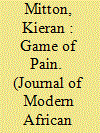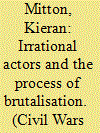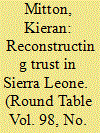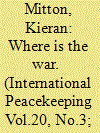|
|
|
Sort Order |
|
|
|
Items / Page
|
|
|
|
|
|
|
| Srl | Item |
| 1 |
ID:
183920


|
|
|
|
|
| Summary/Abstract |
Within two decades, Sierra Leone's ‘cliques’ have transformed from peripheral social clubs to warring Crips, Bloods, and Black street gangs at the heart of criminal and political violence. Nevertheless, they remain severely under-studied, with scholarship on Sierra Leonean youth marginality heavily focused on ex-combatants. Drawing on extended fieldwork with Freetown's cliques as they played the ‘game’ – the daily hustle to survive and resist the ‘system’ – this article offers two main contributions. First, it addresses the knowledge gap by charting the origins, evolution and contemporary organisation of these new urban players. Second, it argues that although this history reveals continuity in perennial forms of youth marginalisation, it also shows that the game itself has changed. Cycles of escalating violence and growth are hardwired into this new game. Exacerbated by a political system that sustains and exploits them, cliques present a far greater challenge to everyday peace than has hitherto been recognised.
|
|
|
|
|
|
|
|
|
|
|
|
|
|
|
|
| 2 |
ID:
111223


|
|
|
|
|
| Publication |
2012.
|
| Summary/Abstract |
In the 1990s, vivid accounts of atrocities committed by Sierra Leone's drug-fuelled child soldiers contributed to the portrayal of so-called 'resource wars' as some violent descent into a primordial anarchy. The academic rebuttal that inevitably followed stressed, by contrast, the very ordered nature of civil conflict, placing the rational actor at the centre of supposedly 'irrational' violence. This article nevertheless finds the rational-actor argument inadequate for explaining the most seemingly senseless acts of atrocity and calls for greater focus on expressive and psychological micro-foundations of violence in the study of civil wars.
|
|
|
|
|
|
|
|
|
|
|
|
|
|
|
|
| 3 |
ID:
089416


|
|
|
|
|
| Publication |
2009.
|
| Summary/Abstract |
In 2004, Sierra Leone's Truth and Reconciliation Commission reported that building public trust in Sierra Leone's post-conflict government and political system was a precondition for development in all sectors of society. This article assesses progress in this venture, and finds that problems of deep distrust continue to pervade all levels of socio-political interaction in Sierra Leone. Nevertheless, the manner in which political trust is conceptualised in Sierra Leone is changing as traditional inequitable systems of patronage are gradually rejected. Noting this trend, it is a central argument of this article that the channelling of prevailing political cynicism into mechanisms of accountability, combined with the earning of public trust by exemplary political leaders, represents the most effective way to reconstruct trust in government, the political system, and throughout Sierra Leone in general.
|
|
|
|
|
|
|
|
|
|
|
|
|
|
|
|
| 4 |
ID:
124441


|
|
|
|
|
| Publication |
2013.
|
| Summary/Abstract |
The Sierra Leone civil war of 1991-2002 has widely been regarded as stemming from the desperate political and socio-economic conditions that affected the country's youth. Following the end to hostilities, there has been great concern to address youth grievances as a means of consolidating peace and stability. There have been frequent warnings in UN, NGO and academic reports of the dangers of limited progress in this regard, and it has been suggested that persistent pre-war conditions are undermining ex-combatants' investment in peace and increasing risks of a return to conflict. However, since 2002 Sierra Leone has experienced relatively low levels of violence. This article seeks to make sense of this seemingly propitious outcome. Informed by interviews conducted with ex-combatants between 2008-2012, it argues that risks of a return to arms have been exaggerated. Nevertheless, economic and political conditions continue to reconnect ex-combatants with violence in the context of 'peacetime.'
|
|
|
|
|
|
|
|
|
|
|
|
|
|
|
|
|
|
|
|
|